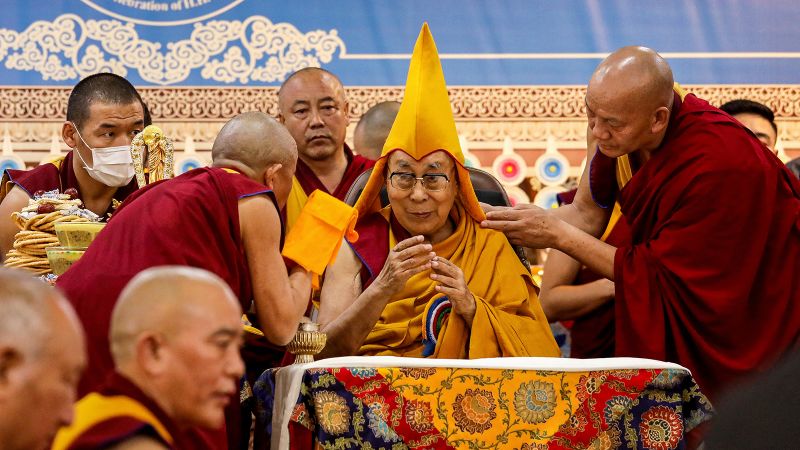
The Dalai Lama has announced his intention to appoint a successor, ensuring the continuation of a centuries-old tradition that has become a focal point in the ongoing conflict between Tibetan Buddhism and China’s Communist Party. On Wednesday, the spiritual leader conveyed this decision through a video message to religious elders gathered in Dharamsala, India, where he has resided since fleeing a failed uprising against Chinese rule in 1959.
“I am affirming that the institution of the Dalai Lama will continue,” the Dalai Lama declared in the pre-recorded message, referencing numerous requests from Tibetans and Tibetan Buddhists urging him to maintain the tradition. He emphasized that the Gaden Phodrang Trust, the formal office of the Dalai Lama, retains the sole authority to recognize his future reincarnation, stating, “No one else has any such authority to interfere in this matter.”
Historical Context and Ongoing Struggle
This announcement comes as the Dalai Lama approaches his 90th birthday, a milestone that has heightened discussions about his succession. Historically, the selection of a new Dalai Lama involves intricate religious rituals and consultations with high lamas of Tibetan Buddhism. However, the process has become increasingly contentious due to China’s insistence on controlling the appointment.
Since the Dalai Lama’s exile, the Chinese government has sought to assert its influence over Tibetan Buddhism, viewing the spiritual leader as a separatist threat. In contrast, the Dalai Lama has consistently advocated for Tibetan autonomy and cultural preservation, making his succession a symbolic battleground.
Implications of the Dalai Lama’s Decision
The Dalai Lama’s recent statement underscores his determination to preserve the integrity of his office. By asserting that his successor will be born in the “free world” outside China, he challenges Beijing’s authority. This stance could potentially lead to the emergence of two rival Dalai Lamas: one chosen by the Tibetan community in exile and another appointed by the Chinese Communist Party.
In a memoir published earlier this year, the Dalai Lama urged his followers to reject any candidate selected by Beijing, further complicating the succession process. This development sets the stage for a high-stakes confrontation between Tibetan leaders in exile and the Chinese government.
Expert Opinions and Future Prospects
Experts in Tibetan affairs highlight the significance of the Dalai Lama’s announcement. Dr. Robert Barnett, a leading scholar on Tibet, notes, “The Dalai Lama’s decision to publicly affirm the continuation of his lineage is a strategic move to safeguard Tibetan cultural identity against external pressures.”
Meanwhile, Chinese authorities have reiterated their stance, claiming exclusive rights to approve the next Dalai Lama. This assertion is rooted in historical precedents where Chinese emperors played roles in the selection process. However, critics argue that the current regime’s atheistic policies undermine its legitimacy in religious matters.
Looking Ahead
The Dalai Lama’s announcement not only reaffirms his commitment to Tibetan Buddhism but also signals a renewed phase in the struggle for Tibetan autonomy. As the spiritual leader approaches his 90th year, the question of his succession looms large over the future of Tibet and its people.
With both sides preparing for a potential showdown, the international community’s role in mediating this conflict could prove crucial. The Dalai Lama’s enduring influence and advocacy for non-violence continue to inspire global support for the Tibetan cause.
As the world watches closely, the outcome of this succession battle will likely shape the trajectory of Tibetan Buddhism and its relationship with China for years to come.







